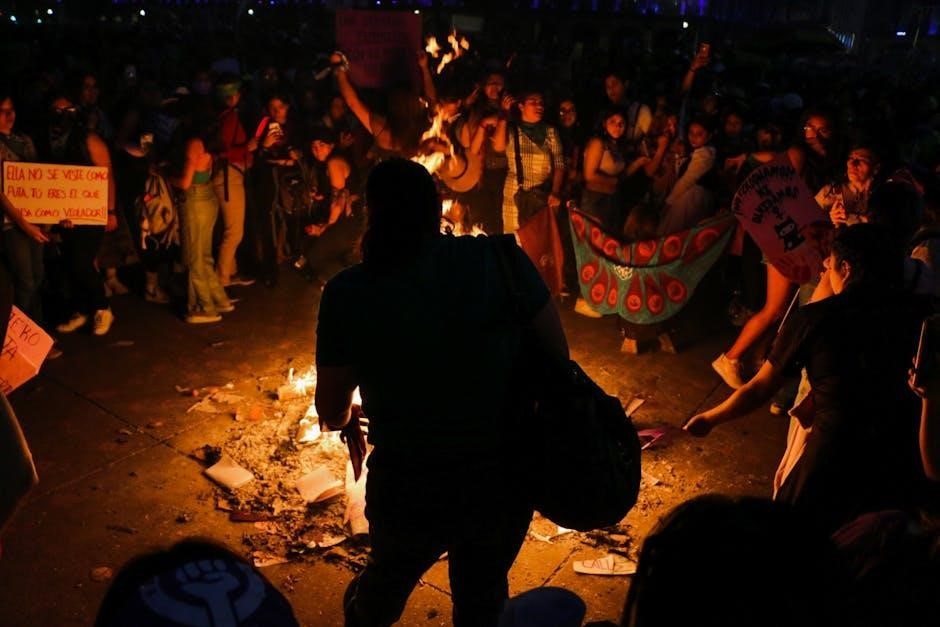Born in Blood and Fire: Latin American Voices by John Charles Chasteen is a concise history exploring Latin America’s complex past, from conquest to modern times, blending cultural and political narratives.
Overview of the Book
Born in Blood and Fire: Latin American Voices is a companion reader to John Charles Chasteen’s concise history of Latin America. It provides primary sources that complement the main text, offering insights into the region’s social, cultural, and political history. The book includes diverse voices, from colonial-era documents to modern narratives, creating a rich tapestry of Latin America’s complex past and its ongoing struggles and transformations. This anthology is essential for understanding the region’s identity and evolution.
Historical Context of Latin America
Latin America’s history is deeply rooted in conquest, colonization, and the blending of indigenous, European, and African cultures. The region’s past is marked by the arrival of Spanish and Portuguese colonizers, the exploitation of native populations, and the rise of slavery. These events shaped the social, political, and economic structures that define Latin America today. The historical context highlights the resilience of diverse cultures and their struggles for independence, setting the stage for the region’s complex modern identity and ongoing challenges. This legacy is central to understanding Latin America’s evolution.

Author Background: John Charles Chasteen
John Charles Chasteen is a renowned historian specializing in Latin American history, known for his accessible and engaging writing style, making complex historical narratives understandable for diverse audiences.
Biography and Academic Contributions
John Charles Chasteen is a distinguished historian with a focus on Latin America. His work combines rigorous scholarship with narrative flair, making history accessible to broad audiences. Chasteen has authored several influential books, including Born in Blood and Fire, which offers a concise yet comprehensive overview of Latin America’s history. His contributions have significantly shaped the field, providing essential insights into the region’s cultural, social, and political evolution over centuries.
Chasteen’s Approach to Latin American History
John Charles Chasteen’s approach to Latin American history is distinguished by his narrative flair and ability to weave together diverse voices. He emphasizes the region’s cultural richness and political complexity, drawing on primary sources to create vivid, accessible accounts. Chasteen’s work bridges academic rigor and readability, making Latin America’s history engaging for students and general readers alike. His method highlights the interconnectedness of social, cultural, and political dynamics, offering a holistic understanding of the region’s evolution.
Structure and Content of the Book
Born in Blood and Fire: Latin American Voices is organized thematically, incorporating primary sources that align with the main text, providing a comprehensive understanding of Latin American history and culture.
Table of Contents and Organization
The book is divided into thematic chapters, each focusing on key historical periods and cultural movements. It begins with the colonial era, moving through independence, modernization, and contemporary issues. The companion reader aligns with the main text, offering primary sources that enrich understanding. This structure provides a chronological and thematic framework, allowing readers to explore Latin America’s diverse history and cultural identity comprehensively. The organization ensures a seamless flow from conquest to modern times, highlighting the region’s complex evolution.
Key Themes and Topics Covered
The book delves into themes such as colonialism, slavery, independence movements, and social revolutions. It examines cultural identity, race, and gender, highlighting the voices of marginalized groups. Economic struggles, political instability, and modernization efforts are also explored. The companion reader includes primary sources like letters, speeches, and literary works, offering firsthand insights into these themes. Together, they provide a rich tapestry of Latin America’s history, emphasizing its diversity and resilience in the face of adversity, from the past to the present day.

Primary Sources in the Book
Born in Blood and Fire: Latin American Voices includes letters, speeches, and literary works as primary sources, offering firsthand insights into historical events and cultural perspectives.
Role of Primary Sources in Historical Analysis
Primary sources in Born in Blood and Fire provide unfiltered perspectives, enabling readers to analyze historical events through authentic documents. These sources, such as letters and speeches, reveal the voices of individuals from diverse backgrounds, offering a deeper understanding of Latin America’s cultural and political evolution. By examining these materials, readers can engage critically with historical narratives, gaining insights into the region’s complex identity and development over time.
Examples of Primary Sources Included
The book includes diverse primary sources, such as letters, speeches, and literary works, offering direct insights into Latin America’s history. Notable examples include documents from colonial-era leaders and 19th-century writers like Machado de Assis. These sources provide firsthand perspectives on key events, enabling readers to engage with the voices of historical figures and ordinary people, enriching the understanding of the region’s cultural, social, and political transformations over time.
Cultural and Social History of Latin America
Latin America’s cultural identity is shaped by its diverse heritage, blending indigenous, European, and African influences. Social movements have played a pivotal role in shaping its destiny, reflecting the struggles and aspirations of its people throughout history.
Cultural Identity and Diversity
Latin America’s cultural identity is a vibrant mosaic of indigenous traditions, European colonial influences, and African heritage. This diversity is reflected in its languages, music, art, and traditions. The blending of these elements has created unique national identities across the region. Historical events, such as conquest and immigration, have further enriched this cultural tapestry. Born in Blood and Fire highlights how this diversity has shaped the region’s social fabric and continues to influence contemporary society. The interplay of these cultures is a testament to Latin America’s resilience and creativity.
Social Movements and Their Impact
Latin America’s history is marked by powerful social movements that have shaped its trajectory. Labor movements, feminist struggles, and indigenous rights campaigns have been pivotal in challenging inequality and demanding justice. These movements have influenced political reforms, cultural shifts, and economic policies. Born in Blood and Fire examines how such movements have empowered marginalized communities and continue to inspire change. Their legacy endures, reflecting the region’s ongoing struggle for equity and representation.

Political History of Latin America
Latin America’s political history is marked by colonial rule, independence struggles, and shifting regimes. From Spanish and Portuguese dominance to modern democratic transitions, the region has evolved significantly.
Colonial Era and Its Legacy
The colonial era in Latin America, spanning centuries, was defined by European conquest, exploitation, and the imposition of foreign systems. Indigenous populations faced devastating losses due to disease, forced labor, and violence. Spain and Portugal established vast empires, reshaping the region’s political, social, and economic structures. The legacy of colonial rule is evident in persistent inequalities, cultural blending, and the enduring influence of European governance models on modern Latin American nations.
Modern Political Developments
Latin America’s modern political landscape reflects a shift from authoritarian regimes to democratic governance, though challenges persist. Cold War influences and U.S. interventions shaped regional instability. Leaders like Hugo Chávez and Evo Morales championed populist movements, addressing inequality but often clashing with external powers. Contemporary issues include corruption, political polarization, and social unrest, underscoring the region’s complex path toward stability and inclusive development.
Economic Development in Latin America
Latin America’s economic journey reflects colonial exploitation, resource dependency, and modern struggles with debt and inequality, shaping its complex path toward sustainable growth and development.
Historical Economic Challenges
Latin America faced profound economic challenges rooted in colonial exploitation, resource dependency, and underdevelopment. The colonial era established systems of extraction, enriching European powers while fostering inequality. Post-independence, nations grappled with debt, foreign intervention, and limited industrialization. Dependence on primary commodities exposed economies to global price fluctuations. These legacies, combined with political instability, hindered sustainable growth, perpetuating disparities that persist today, shaping the region’s complex economic trajectory.
Contemporary Economic Issues
Modern Latin America confronts issues like income inequality, inflation, and unstable markets. Many nations rely on exports, making them vulnerable to global price shifts. Debt crises persist, limiting public spending on essential services. Additionally, corruption and political instability undermine economic reforms. Despite progress in some sectors, widespread poverty and uneven development remain significant challenges, affecting regional stability and growth prospects.

Modern Relevance of the Book
Born in Blood and Fire remains relevant today, offering insights into Latin America’s ongoing struggles with identity, inequality, and political instability, resonating with contemporary social justice movements.
Current Significance of the Book’s Themes
Born in Blood and Fire remains a vital resource for understanding Latin America’s enduring struggles with identity, inequality, and political instability. Its themes of colonialism, social justice, and cultural resilience resonate deeply in today’s context of globalization and social movements. The book’s exploration of historical roots of contemporary issues provides a framework for analyzing modern challenges, making it a cornerstone for students and scholars seeking to grasp the region’s complex evolution and its relevance to global discussions.
Reception and Reviews
Born in Blood and Fire has received widespread acclaim for its accessible and comprehensive narrative. Reviewers praise its ability to weave diverse historical threads into a cohesive story, making Latin America’s complex history engaging for both students and general readers. The companion reader, featuring primary sources, is particularly highlighted for enriching the narrative and offering deeper insights. This combination has solidified the book’s reputation as an essential resource in Latin American studies, earning it a place on many syllabi and reading lists.
Born in Blood and Fire offers a compelling narrative of Latin America’s history, blending cultural richness with political turmoil. Its insights remain vital for understanding the region’s enduring legacy and contemporary challenges, making it an indispensable resource for scholars and enthusiasts alike.

Born in Blood and Fire: Latin American Voices by John Charles Chasteen provides a comprehensive overview of Latin America’s history, from colonial conquest to modern times. The book emphasizes the region’s cultural diversity, political struggles, and social movements. It highlights the legacy of colonialism, the impact of slavery, and the resilience of indigenous and African influences. Chasteen’s work is praised for its readability and depth, making it a valuable resource for understanding Latin America’s complex identity and its ongoing quest for justice and equality.
Final Thoughts on the Book’s Importance

Born in Blood and Fire: Latin American Voices stands as a vital resource for understanding Latin America’s rich, yet tumultuous history. By weaving together cultural, social, and political narratives, Chasteen provides a balanced perspective that highlights the region’s resilience and diversity; The book’s accessible style and thorough research make it an essential tool for students and scholars alike, ensuring its relevance in shaping a deeper understanding of Latin America’s identity and its ongoing struggles for justice and equality.
